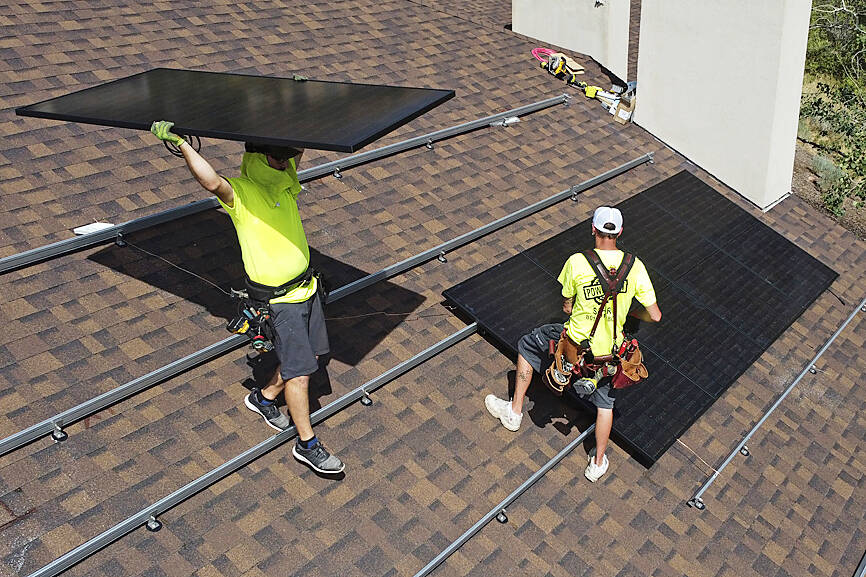More than 1,000 shipments of solar energy components worth hundreds of millions of US dollars have piled up at US ports since June under a new law banning imports from China’s Xinjiang region over concerns about slave labor, US federal customs officials and industry sources said.
The level of seizures, which has not previously been reported, reflects how a policy intended to heap pressure on Beijing over its Uighur detention camps in Xinjiang risks slowing the efforts of US President Joe Biden’s administration to decarbonize the US power sector to fight climate change.
US Customs and Border Protection has seized 1,053 shipments of solar energy equipment between June 21 — when the Uyghur Forced Labor Protection Act (UFLPA) went into effect — and Oct. 25, it said in response to a public records request, adding that none of the shipments have yet been released.

Photo: AP
The agency would not reveal the manufacturers or confirm details about the quantity of solar equipment in the shipments, citing federal law that protects confidential trade secrets.
However, three industry sources with knowledge of the matter said the detained products include panels and polysilicon cells, likely amounting to up to 1 gigawatt of capacity and primarily made by three Chinese manufacturers — Longi Green Energy Technology Co (隆基綠能科技), Trina Solar Co (天合光能) and JinkoSolar Holding Co (晶科能源).
Combined, Longi, Trina and Jinko typically account for up to one-third of US panel supplies. However, the companies have halted new shipments to the US over concerns additional cargoes would also be detained, the industry sources said. The sources asked not to be named because they were not authorized to speak publicly on the matter.
China denies abuses in Xinjiang. It initially denied the existence of any detention camps, but then later said it had set up “vocational training centers” to curb what it said was terrorism, separatism and religious radicalism in Xinjiang.
In an e-mail, Jinko said it is working with US Customs and Border Protection on documentation proving its supplies are not linked to forced labor and is “confident the shipments will be admitted.”
The bottleneck is a challenge to US solar development at a time the Biden administration is seeking to decarbonize the US economy and implement the Inflation Reduction Act (IRA), a new law that encourages clean energy technologies to combat climate change.
Solar installations in the US slowed by 23 percent in the third quarter, and nearly 23 gigawatts of solar projects are delayed, largely due to an inability to obtain panels, the American Clean Power Association trade group said.
The association urged the Biden administration to streamline the vetting process for imports.
“After more than four months of solar panels being reviewed under UFLPA, none have been rejected and instead they remain stuck in limbo with no end in sight,” it said in a statement.
The UFLPA essentially presumes that all goods from Xinjiang are made with forced labor and requires producers to show sourcing documentation of imported equipment back to the raw material to prove otherwise before imports can be cleared.

Macronix International Co (旺宏), the world’s biggest NOR flash memory supplier, yesterday said it would spend NT$22 billion (US$699.1 million) on capacity expansion this year to increase its production of mid-to-low-density memory chips as the world’s major memorychip suppliers are phasing out the market. The company said its planned capital expenditures are about 11 times higher than the NT$1.8 billion it spent on new facilities and equipment last year. A majority of this year’s outlay would be allocated to step up capacity of multi-level cell (MLC) NAND flash memory chips, which are used in embedded multimedia cards (eMMC), a managed

CULPRITS: Factors that affected the slip included falling global crude oil prices, wait-and-see consumer attitudes due to US tariffs and a different Lunar New Year holiday schedule Taiwan’s retail sales ended a nine-year growth streak last year, slipping 0.2 percent from a year earlier as uncertainty over US tariff policies affected demand for durable goods, data released on Friday by the Ministry of Economic Affairs showed. Last year’s retail sales totaled NT$4.84 trillion (US$153.27 billion), down about NT$9.5 billion, or 0.2 percent, from 2024. Despite the decline, the figure was still the second-highest annual sales total on record. Ministry statistics department deputy head Chen Yu-fang (陳玉芳) said sales of cars, motorcycles and related products, which accounted for 17.4 percent of total retail rales last year, fell NT$68.1 billion, or

In the wake of strong global demand for AI applications, Taiwan’s export-oriented economy accelerated with the composite index of economic indicators flashing the first “red” light in December for one year, indicating the economy is in booming mode, the National Development Council (NDC) said yesterday. Moreover, the index of leading indicators, which gauges the potential state of the economy over the next six months, also moved higher in December amid growing optimism over the outlook, the NDC said. In December, the index of economic indicators rose one point from a month earlier to 38, at the lower end of the “red” light.

MediaTek Inc (聯發科) shares yesterday notched their best two-day rally on record, as investors flock to the Taiwanese chip designer on excitement over its tie-up with Google. The Taipei-listed stock jumped 8.59 percent, capping a two-session surge of 19 percent and closing at a fresh all-time high of NT$1,770. That extended a two-month rally on growing awareness of MediaTek’s work on Google’s tensor processing units (TPUs), which are chips used in artificial intelligence (AI) applications. It also highlights how fund managers faced with single-stock limits on their holding of market titan Taiwan Semiconductor Manufacturing Co (TSMC, 台積電) are diversifying into other AI-related firms.